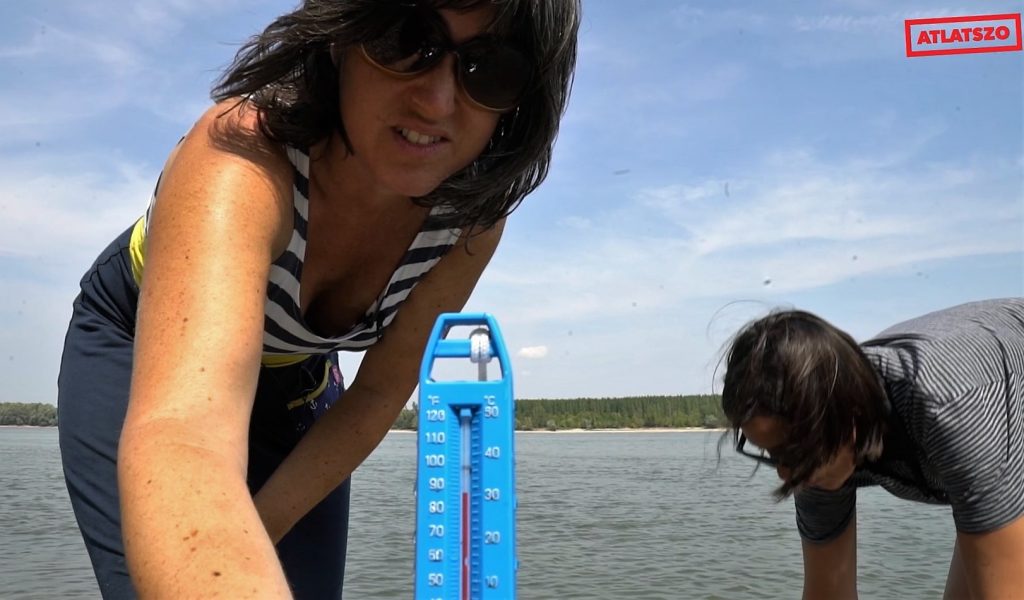The https://english.atlatszo.hu use cookies to track and profile customers such as action tags and pixel tracking on our website to assist our marketing. On our website we use technical, analytical, marketing and preference cookies. These are necessary for our site to work properly and to give us inforamation about how our site is used. See Cookies Policy
Police investigation into overheated river at Paks NPP after report by MEP Benedek Jávor
Hungarian police are investigating whether the water in the river Danube was warmer than 30 degrees at the Paks nuclear plant during the August heatwave. According to Hungarian regulations, if the water temperature reaches that point, the nuclear plant has to be shut off. It was not, but there is a suspicion that water temperature did reach 30 degrees. Hungarian MEP Jávor Benedek filed a report at the police and now the case is being investigated.
According to measurements by Átlátszó and Energiaklub, the temperature of the river Danube reached 30 °C during the August heatwave, exactly where the Paks nuclear plant’s cooling water enters the river.
According to a 2001 government decree, the Paks nuclear plant must cease operations for environmental reasons if the temperature of the Danube reaches 30 °C anywhere in the 500 meters following the point where the cooling water is deposited into the river.
The nuclear plant’s official thermometer never measured more than 30 °C in August, therefore the power plant or any of its blocks were not shut off. Concerned about the river’s ecosystem, MEP Benedek Jávor requested a police investigation.
The first step that led to the current investigation was when Átlátszó and Energiaklub, a Hungarian NGO, measured the water temperature in August. Energiaklub had requested the official data about the river’s temperature before, filing a freedom of information request. However, during the time of the heatwave Paks stopped announcing their official data. Átlátszó’s group of experts had assumed that the temperature of the water rose above 30 °C.
To prove this, and to protect wildlife in the river, we traveled to Paks and measured the water temperature. Before the point of entry of the nuclear plant’s cooling water, we measured 25-26 °C. Downstream, however, within 500 meters from the cooling water’s entry point, we measured above 30 °C at multiple locations.
We took a video of the process and published an article about our unofficial data. These show that at every single location downstream where we measured the river’s temperature, it exceeded the 30 °C.
30 fok feletti vízhőmérsékleteket mértünk a Dunában Paksnál – a hivatalos hőmérő „elromlott” from atlatszo.hu on Vimeo.
The official numbers and Átlátszó’s findings do not match
After the publication of our findings, the MVM Paksi Atomerőmű Zrt. quickly made their measurements public. According to them, the highest ever temperature of the water was 29.88 °C in August. Specifically, they claimed that on the day when we checked it (August 24), the river’s temperature was only 28.42 °C.
Strangely, the datasets match in regards to the area upstream: 25.7 °C, but they do not match downstream. One possible explanation: MVM claims they measured the temperature at 7.00am, 50 cm deep in the water, in the middle of the river.
The official methodology of how the nuclear power plant should measure and register the temperature of the Danube after its cooling water is deposited in it is currently not public. Strangely, while the thermometers at Paks register the temperature of the Danube every second, somehow for the duration of the heatwave, they switched to measurement by hand, once a day, at the coolest hour of the day.
In addition, the original study on the environmental impact of the expansion of the power plant assumes that what happened in 2018 August could only happen once in 100,000 years. This means that that study is already flawed regarding its assumption of the river’s discharge and temperature.
Energiaklub and Benedek Jávor request an investigation
Early September, Energiaklub requested the Hungarian Environmental Protection Agency that they start official proceedings against the Paks nuclear power plant’s illegal activities.
Benedek Jávor, PhD, biologist, Member of the European Parliament and its Greens/European Free Alliance group, requested a police investigation at the same time.
Instead of proceeding with the inspection, the police first requested Mr. Jávor to collect more evidence. “When my team submitted new evidence, the police finally initiated their investigation late October” – announced Mr. Jávor on his Facebook page on October 29.
Written by Babett Oroszi
English version by Zsuzsanna Liptákné Horváth. You can read the original, Hungarian-language story here.

